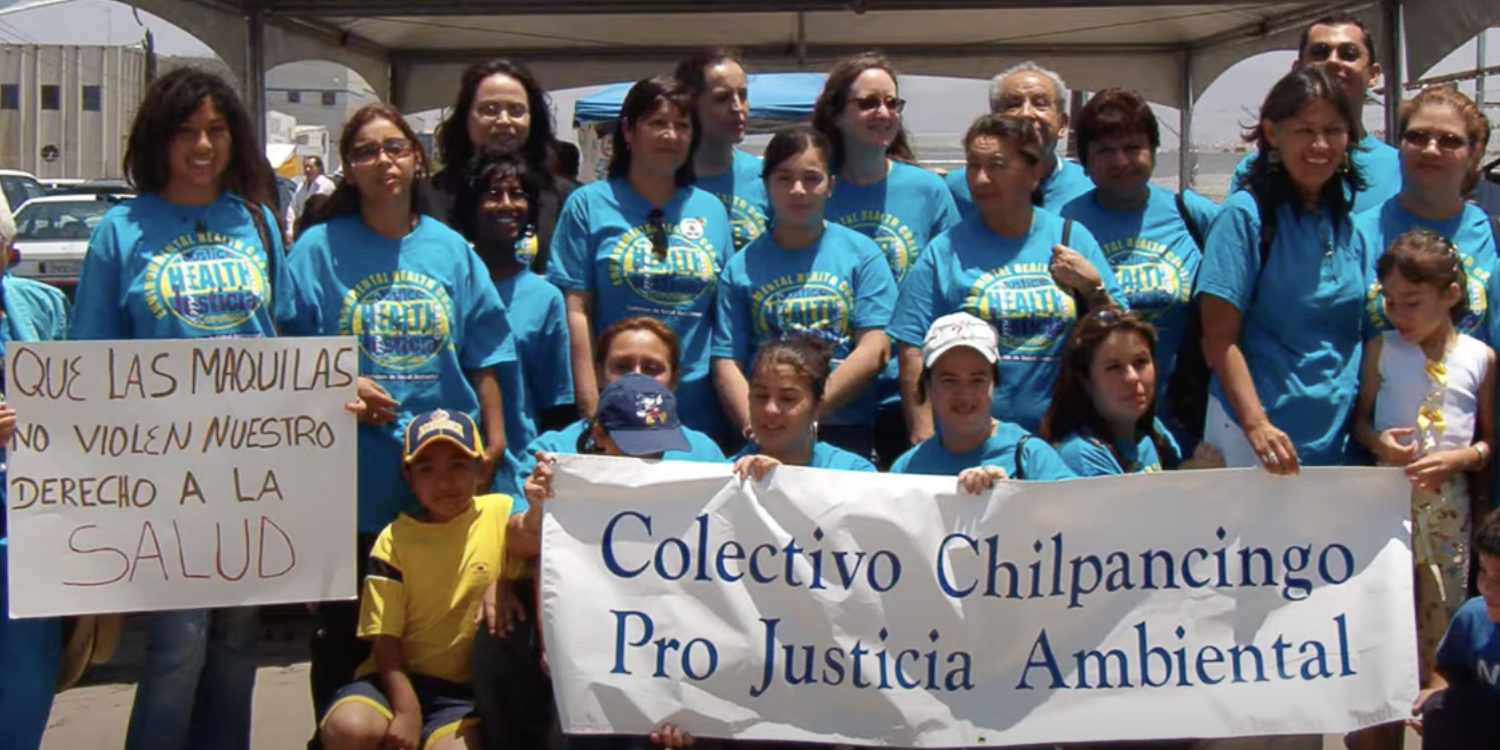Fronteriza Care Work Epistemology and Environmental Justice Organizing in Tijuana-San Diego
Carolina Prado
18 November 2024Environmental justice activists at the border strategically use their lived experiences as fronterizas and care workers to both identify issues in their community as well as to link their localized realities to global political economic processes

Along the route from the Otay Mesa border crossing and the Colectivo Salud y Justicia office, you will find yourself surrounded by semi-trucks. They may be on their way to load merchandise at the maquiladora industrial park, or the may be en route to cross these goods into the U.S. These semi-trucks are loud and heavy with diesel engines notorious for their high levels of emissions. Though there are established routes for them, they frequently cut through residential neighborhoods as this saves drivers gas and time in a competitive profession. From the Colectivo office, you will continue to see these trucks, day and night, making the house shake and spilling gray smoke into the air.
From the beginning of their work as a collective, the Colectivo women’s practice of care work led to the identification of the environmental issues in their neighborhood. From observing the health issues Metales y Derivados brought upon their community, to identifying air contamination in the neighborhood school areas, and naming the channelization of the Alamar as a problem, these issues were clear to Colectivo activists from their everyday experience as mothers and community activists. This place-based and gendered knowledge is a difficult one to make visible to decision makers however, as it is outside of professionalized value system that prioritizes formalized expertise and de-validates embodied, community knowledge.
What is Fronteriza Care Work Epistemology?
Fronteriza care work epistemology is where the embodied situated knowledge of care work and border thinking meet. Because Colectivo members must practice their family and community care work within the context of a globalized borderlands, their epistemological foundations incorporate a social and political economic lens they apply to the environmental and health conditions of their community. A fronteriza care work epistemology includes three core elements: (1) the engagement in political processes that is influenced by care work practices, (2) border thinking that highlights the role that imperialism plays in shaping the lives of border residents and (3) the situated knowledges that emerge from fronteriza social relationships across the border region. This framework is building from situated knowledge frameworks, feminist care work theory, decolonial theory’s engagement with border thinking, and the border studies contributions on fronteriza experiences.
Fronteriza Care Work Epistemology at Work
The Colectivo activists’ impetus for addressing the hazardous waste site at Metales y Derivados came out of conversations they had with other community members about miscarriages and birth defects on their block. Colectivo activists discussed seeing people at the doctor with rashes, seeing workers walking down the mesa with lead dust on their clothes and skin, meeting mothers of children born with birth defects, and experiencing miscarriages themselves. For example, Sonia Pérez, a Colectivo activist said, “I would hear about how the young women that were pregnant would birth [babies with] androcephaly. In one way or the other, we also saw many miscarriages, many. Then we saw the factory was right above the kindergarten.” Most of the activists had the experience of working in the maquiladora industry and coming into contact with the harmful chemicals used. Mayra, for example, was told repeatedly that washing her work clothes with that of her kids would be harmful for their health. The Colectivo activists based their knowledge of environmental justice issues on this shared practice of care work.
Fronteriza care work epistemology can be seen in action in the ways in which the Colectivo identified their campaigns throughout their trajectory, and also in the ways their strategies folded in issues of globalization into their local environmental justice grievances. Because of the border thinking that Colectivo women hold as fronterizas, they understood and harnessed the narratives around globalization and global justice to bring more urgency to the issue of Metales y Derivados.
In the Metales y Derivados campaign, the Colectivo used their fronteriza care work epistemology to link this local case of environmental injustice to globalization and free trade. Critiquing free trade agreements was a tool to attract the attention of their government representatives, as NAFTA continued to be a hotly contested topic in this time period. In my content analysis on materials referring to the case of Metales y Derivados, I found that in 67 percent of the newspaper articles and materials produced by the EHC and the Colectivo, the cross-border network members deployed a local environmental justice frame; in 81 percent of they use a global justice frame.
Futures of Situated Strategies
The work the Colectivo Salud y Justicia Ambiental has built for border environmental justice has used the intersections of their situated knowledges and strategies as care workers, border thinkers and connected fronterizas. Fronteriza care work epistemology helps shed light on the different levels of political identities and practices that led the Colectivo activists to identify their campaigns as well informed their social movement framing. Identifying more situated strategies like fronteriza care work epistemology is important in building understanding of collective action around other local-global issues into the future.
Image: Screenshot from Environmental Health Coalition YouTube Channel, authorized by the Collective